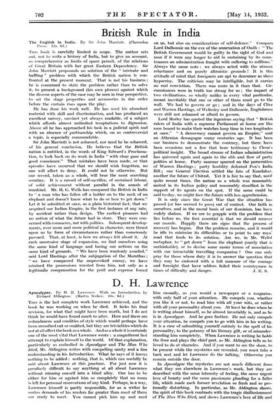British Rule in India
'fins book is carefully limited in scope. The author sets out, not to write a history of India, but to give an account, as comprehensive as limits of space permit, of the relations of Great Britain with her great Eastern Dependency. Sir John Marriott propounds no solution of the intricate and baffling" problem with which the British nation is con- fronted at the present moment. That is not his business ; he is concerned to state the problem rather than to solve it, to present a background (his own phrase) against which the diverse aspects of the ease may be seen in true perspective, to set the stage properties and accessories in due order before the curtain rises upon the play.
Ile has done his work well. Ile has used his abundant material with skill and discrimination, and has produced an excellent survey, succinct yet always readable, of a subject which affords almost unlimited temptations to digression. Above all he has approached his task in a judicial spirit and with an absence of partisanship which, on so controversial a topic, is especially commendable.
Sir John Marriott is not ashamed, nor need he be ashamed, of his general conclusion. He believes that the British nation is entitled, in the words of King Edward's Proclama- Him, to look back on its work in India "with clear gaze and good conscience." That mistakes have been made, or that episodes have occurred that we should wish forgotten, no one will affect to deny. It could not be otherwise. But our record, taken as a whole, will hear the most searching scrutiny. It is a record of self-sacrifice, of sustained labour, of solid achievement without parallel in the annals of mankind. Mr. H. G. Wells has compared the British in India to " a man who has fallen off a ladder on to the neck of an elephant and doesn't know what to do or how to get down." Let it be admitted at once, as a plain historical fact, that we acquired our Indian Empire, in the first instance at any rate, by accident rather than design. The earliest pioneers had no notion of what the future had in store. They were con- cerned with commerce, not with polities. Subsequent develop- ments, ever more and more political in character, were thrust upon us by force of circumstances rather than consciously pursued. That, at least, is how we always felt about it. At each successive stage of expansion, we find ourselves using the same kind of language and basing our actions on the same kind of grounds. "We have been wantonly assailed," said Lord Hastings after the subjugation of the Marathas ; " we have conquered the unprovoked enemy, we have retained the possessions wrested from him, not only as a legitimale compensation for the peril and expense forced on us, but also on considerations of self-defence." Compare Lard Dalhousie on the eve of the annexation of Oudh : "The British Government would be guilty in the sight of God and man if it were any longer to aid in sustaining by its coun- tenance an administration fraught with suffering to millions." Always the same note : we always acted with the utmost reluctance and on purely altruistic grounds 1 It is this attitude of mind that foreigners are apt to denounce as sheer hypocrisy. The criticism may be intelligible, but it carries no real conviction. There was more in it than that. Cir- cumstances were in truth too strong for us ; the impact of two civilizations, so wholly unlike in every vital particular, meant inevitably that one or other of them must go to the Wall. We had to govern or go ; and in the days of Clive and Warren Hastings, of Wellesley and Dalhousie, Englishmen were still not ashamed or afraid to govern.
Lord Morley has quoted the ingenious saying that "British rulers of India with a supreme Parliament at home are like men bound to make their watches keep time in two longitudes at once." "A democracy cannot govern an Empire," said an Athenian demagogue many centuries ago. It has been our business to demonstrate the contrary, but there have been occasions not a few that bore testimony to Cleon's political insight. The broad stream of Indian administration has quivered again and again to the ebb and flow of party politics at home. Party rancour spurred on the persecution of Warren Hastings ; party hostility defeated Fox's India Bill ; one General Election settled the fate of Kandahar, another the future of Chitral. Yet it is fair to say that, until quite recent times, the nation as a whole was reasonably united in its Indian policy and reasonably steadfast in the support of its agents on the spot. If the same could be said to-day, we might face the future with less apprehension.
It is only since the Great 'War that the situation has passed (or has seemed to pass) out of control. Our faith in ourselves, and in the moral basis of our dominion, has been rudely shaken. If we are to grapple with the problem that lies before us, the first essential is that we should recover our morale. Happily there are signs that the process of recovery has begun. But the problem remains, and it would be idle to minimize its difficulties or to point to any roya' road that leads to its solution. Are we, in Mr. Wells' metaphor, to "get down" front the elephant (surely that is unthinkable), or to devise some easier terms of association with our intractable travelling companion ? One can only pray for those whose duty it is to answer the question that they may be endowed with a full measure of the courage and foresight that have seldom failed their 'countrymen in




































 Previous page
Previous page